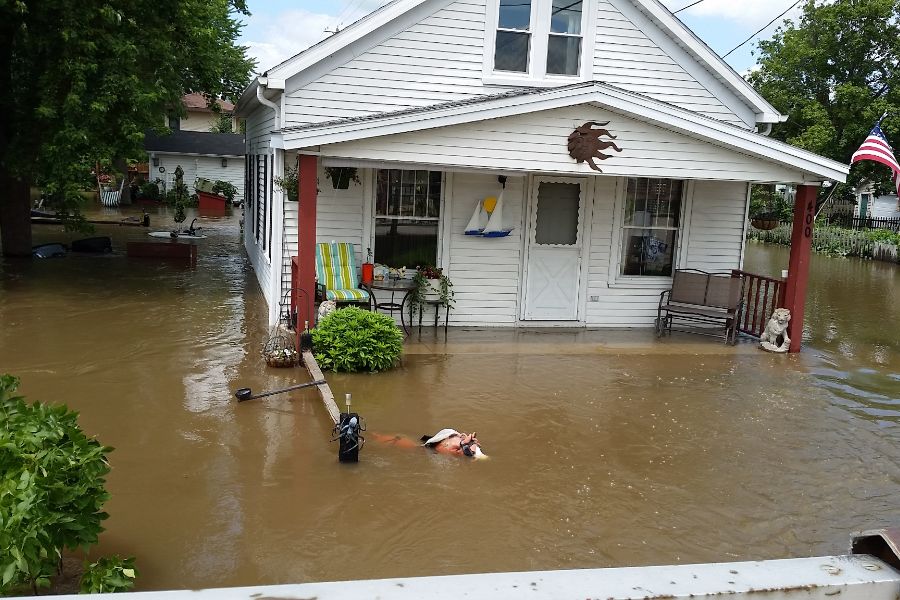Flood Prevention Laws Needed
State’s annual rainfall up by 7 inches and "100-year floods" now happen routinely.
Emergencies hit communities without notice and threaten our local economies. We are facing an unprecedented public health emergency right now, but we have faced emergencies before and we’ve become stronger from it.
Flooding in western Wisconsin has tested our communities’ responses to emergencies. Public health emergencies and flooding are dramatically different emergencies, but both require us to work together to keep our communities healthy and safe.
We’ve seen political leaders show up for photo opportunities when something dramatic happens, especially after a natural disaster. It’s not bad when leaders show up; it’s important they see firsthand what happened and be an advocate, but there’s more to do. We need to know how we can prevent disasters in the future and how to support those affected by these events.
That’s why, just last week, I joined Governor Tony Evers for a visit to the Town of Dodge and the City of Arcadia. Last year, Governor Evers made the same visit when both places were flooded in Trempealeau County. Flooding has become an annual occurrence in these places. What we once called 100-year floods are now considered normal.
Between 1950 and 2006, communities in every region of Wisconsin, have experienced an increase of average annual rainfall by more than 7 inches, according to the Wisconsin Initiative on Climate Change Impacts. The increase in rainfall, along with destruction of our wetlands and failing infrastructure, directly correlate to the escalating frequency of floods in Wisconsin. Together, these factors threaten our community’s public safety, health and economic security.
In the meetings, residents and local officials voiced concerns that flood prevention measures cost too much. Local town, city and county budgets are already stretched and cannot handle the expensive fixes needed to protect residents from flooding. That’s where the state needs to step up to the plate.
After the tour of Trempealeau County, Governor Evers, myself and several of my legislative colleagues introduced the Flood Prevention & Resilience Plan, a package of 6 bills directly targeted toward flood prevention and relief. This package of bills will:
- Invest $10 million into the Municipal Flood Control grant program to help municipalities fund flood prevention projects, including flood proofing, riparian restoration, acquisition of vacant land, construction of flood control structures and flood mapping projects.
- Create a flood mitigation program to proactively address infrastructure that is identified as at-risk and provide local units of government with grant reimbursements to cover 50% of the cost of modifying, replacing, or relocating culverts or bridges.
- Increase funding for the Soil and Water Resource Management grant program to promote the installation of structural pollution-abatement and conservation practices.
- Require all emergency work, designated by Federal Emergency Management Agency, be eligible for disaster assistance payments, including debris removal, protective measures for roads and bridges, water control facilities, utilities, and parks. Legislation will also reduce the amount recipients of disaster assistance payments are required to make.
- Allow individuals to deduct amounts of premiums paid for flood insurance from their taxes.
- Incentivize local governments to rebuild infrastructure at a higher capacity to withstand flooding by increasing the reimbursement rate paid to local governments.
These flood prevention investments will help local governments rebuild and prepare when the next flood emergency happens. I’m impressed by Governor Evers’ commitment to take proactive steps to help communities susceptible to flooding. Governor Evers didn’t show up for a photo opportunity in a disaster area. He came back when the cameras weren’t rolling to talk with people about how to make their lives better and communities stronger.
Now, it’s up to the Legislature to move forward on these proposals. In the meantime, remember to do everything you can to prepare yourself by getting flood insurance and staying educated by visiting FloodSmart.gov.
Wisconsin State Senator Jeff Smith represents Wisconsin’s 31st Senate District.
Op-Ed
-
Wisconsin Candidates Decry Money in Politics, Plan to Raise Tons of It
 Dec 15th, 2025 by Ruth Conniff
Dec 15th, 2025 by Ruth Conniff
-
Trump Left Contraceptives to Rot; Women Pay the Price
 Dec 8th, 2025 by Dr. Shefaali Sharma
Dec 8th, 2025 by Dr. Shefaali Sharma
-
Why the Common Council’s Amended Budget is Good Policy for Milwaukee
 Nov 20th, 2025 by Alds. Marina Dimitrijevic and Russell W. Stamper, II
Nov 20th, 2025 by Alds. Marina Dimitrijevic and Russell W. Stamper, II






















